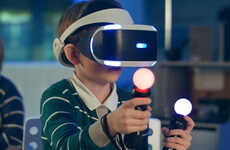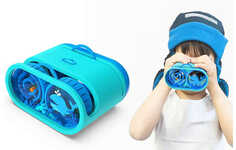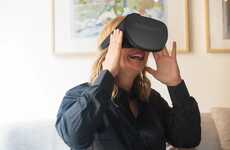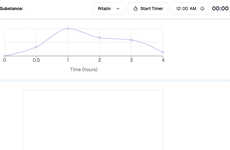
This VR Eye-Tracking Game Could Help with ADHD Diagnoses
Michael Hemsworth — December 21, 2022 — Lifestyle
This VR eye-tracking game is being proposed as a way to help objectively help health administrators to diagnose ADHD amongst children to deliver a more effective approach to the notoriously difficult process. The game builds on the EPELI virtual reality (VR) game that was previously developed as a way to monitor the ADHD symptoms a person might be having. The diagnostic tool could work effectively as a way to track for patterns found in eye movements and works in combination with machine learning.
One of the original developers of EPELI Topi Siro spoke on the VR eye-tracking game saying, "The player has to remember the tasks despite distractions in the environment, such as a TV being on. The game measures everything: how much the child clicks on the controls and how efficiently they perform the tasks. Efficiency correlates with everyday functioning, whereas children with ADHD often have challenges."
Image Credit: Pelli Vision Oy
One of the original developers of EPELI Topi Siro spoke on the VR eye-tracking game saying, "The player has to remember the tasks despite distractions in the environment, such as a TV being on. The game measures everything: how much the child clicks on the controls and how efficiently they perform the tasks. Efficiency correlates with everyday functioning, whereas children with ADHD often have challenges."
Image Credit: Pelli Vision Oy
Trend Themes
1. Vr-powered ADHD Diagnosis - Using VR and eye-tracking technology for objective ADHD diagnosis could disrupt traditional diagnostic methods.
2. Machine Learning in Healthcare - Utilizing machine learning in healthcare could lead to more accurate and efficient diagnoses for various conditions.
3. Gamification of Healthcare - The gamification of healthcare could provide more engaging and effective tools for diagnosis and treatment.
Industry Implications
1. Healthcare - The healthcare industry could benefit from VR and machine learning-based tools for diagnosing and treating conditions such as ADHD.
2. Education - The education industry could utilize VR-powered games to improve ADHD diagnosis and treatment in children.
3. Technology - The technology industry could continue to develop and refine VR and machine learning-based healthcare tools for various needs and conditions.
4.4
Score
Popularity
Activity
Freshness























